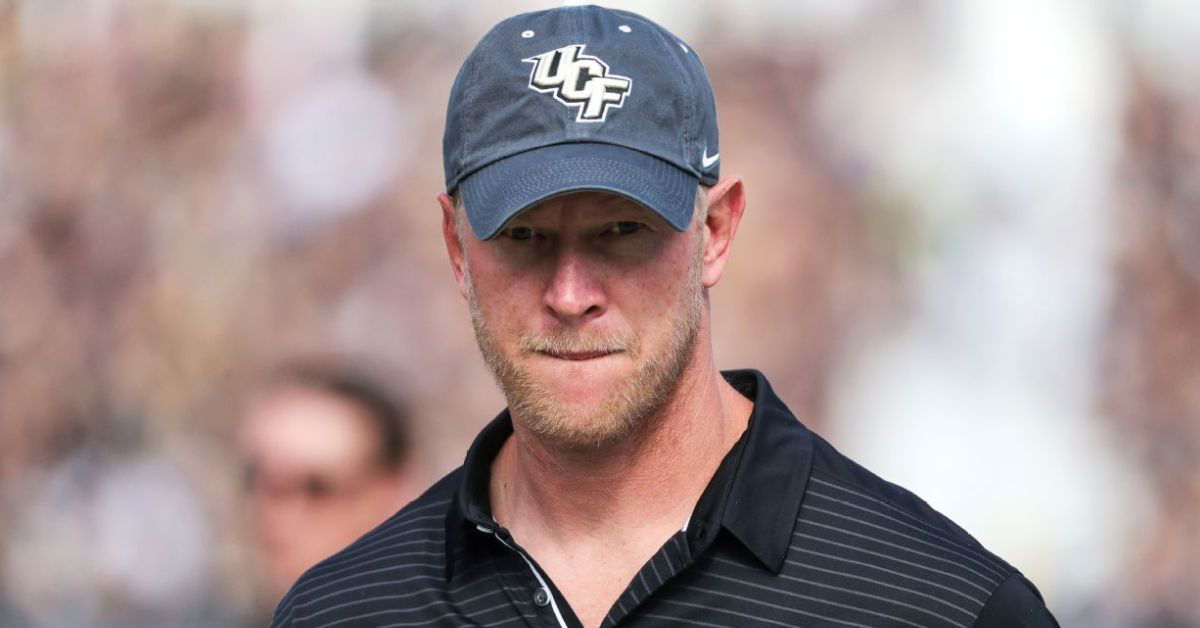

Money talks. And in today’s college football dynamics, it’s shouting louder than ever. The NIL era and the transfer portal have created a fierce competition for talent. Players like Nico Iamaleava seeking a $4 million raise and Carson Beck securing a similar deal with Miami. This kind of money isn’t just reshaping the game. It’s messing up the programs that couldn’t live up to the hype. And UCF’s Scott Frost is learning this the hard way. As teams invest heavily in their rosters, demonstrating that financial investment is now a necessity for success.
Watch What’s Trending Now!
The spring transfer portal was a major blow to Scott Frost and UCF. During camp, five players left: QB Dylan Rizk, C Waltclaire Flynn Jr., CB Tre’Quon Fegans, DT Marcus Downs, and LB DJ McCormick. And for Frost, that situation was concerning. As he made a blunt admission on Sons of UCF, “I’m mad at you for even bringing up a transfer portal right now. I don’t want to think about that. That was not a fun period in my life, and I think that’s the case for most coaches, without speaking for them.”
And that shift comes from a major investment that Big 10, Big 12, and SEC teams made to grab their desired players from the portal. Now, sure, with House vs. NCAA’s revenue-sharing model, things might look more streamlined on paper. But NIL is still unpredictable. And Scott Frost didn’t mince words before laying it out straight: “When this whole thing started, it was supposed to be an NIL and not pay for play, and we went zoom and bought that in about six months. And it was only two or three years ago when Ryan Day made news by saying that he needed 13 million a year to compete. From what I hear now, there are teams spending 40 and $50 million, so I don’t know where it stops, unless we get some guardrails around it.”
ADVERTISEMENT
Transfer Portal: @UCF_Football HC Scott Frost on the Portal and the current state of college athletics. #UCF pic.twitter.com/3OLOA5apPW
— Sons of UCF (@SonsofUCF) July 27, 2025
Ryan Day proved that money not only talks but also wins championships. His $20 million roster revamp last season attracted top-tier talent, resulting in Ohio State securing the national title. This underscores that in modern football, financial strength is a game-changer. When money dominates, recruiting becomes a bidding war.
Following the House v. NCAA ruling’s impact, Texas Tech is fully committing to this new reality. While some schools like CU Boulder are eliminating collectives, Tech is boosting The Matador Club to generate $14 million annually. Funding scholarships and player development. Crucially, CBS Sports’ Brandon Marcello suggests Tech could spend $55 million on revenue sharing and NIL this year. That’s a professional-grade payroll. It’s no surprise Scott Frost is feeling the pressure.
ADVERTISEMENT
Scott Frost is urging a fair competition, advocating for rules that mandate equal spending for all teams and eliminate the financial arms race. As for him, “College football would be a better place if it were equitable and everybody had the same amount to spend.” But for now, NIL is not the only thing that’s concerning him.
ADVERTISEMENT
Scott Frost’s honest admission on QB1 battle
UCF’s situation this season is vastly different from 2017, as they now compete in the Big 12 instead of fighting for relevance in the Group of Five. But after last year’s inconsistent play and disappointing four-win finish, Scott Frost can’t take any chances. And that’s exactly why he is grinding hard between his three QBs: Frost assessing Jacurri Brown, Cam Fancher, and Tayven Jackson to decide who will head the Knights’ offense.
And Scott Frost is already pretty impressed with all three of them. “We’ve got three guys who did well enough in spring that I feel like if they were our starter, I’d feel really good about it. We probably designed the offense a little differently based on who that quarterback was, but all three of them are capable of making us a dangerous team,” he said. Well, he isn’t wrong. All three guys are pretty strong and ready to make an impact.
Top Stories
Sean Payton Confirms Bo Nix’s Season Is Over, Announces Immediate Update on Broncos QB’s Horrific Injury

Sean McDermott Erupts Against Refs’ Controversial Decision After Josh Allen Breaks Silence on Brandin Cooks Incident

Calls Mount Against Tony Romo for Josh Allen Error on Live CBS Telecast During Bills vs Broncos

Andy Reid Announces Double Firing Decision as Patrick Mahomes Outlines Ideal Chiefs OC

Olympic Ice Dance Pair Hit by Major Crisis Just Weeks Before Milano-Cortina Games

Caleb Williams Puts Locker Room on Notice After Rams Publicly Announce Bears QB’s Weakness

Jacurri Brown starts camp with an advantage, being the only UCF quarterback who threw a pass last season. The 6-foot-4, 220-pound dual-threat showed potential in nine games, with 398 passing yards, one touchdown, and four interceptions. He also ran for 401 yards and four touchdowns. Brown’s experience gives him a good grasp of the offense, but he must limit errors to stay ahead in the competition.
ADVERTISEMENT
Still, Brown is not out of the woods, as Tayven Jackson and Cam Fancher are posing a threat to his starting position. Jackson, a former four-star recruit with SEC experience from Tennessee and Indiana, passed for 349 yards, four touchdowns, and one interception in 2024. Fancher, a left-hander, has the most experience, entering his fifth year after playing at Marshall and Florida Atlantic. In 2024 with the Owls, he completed 59% of his passes for 1,528 yards, six touchdowns, and six interceptions, while rushing for 365 yards and three scores.
So, with so much talent on the table, how will Scott Frost shuffle the deck and decide his QB1? Well, the plan is pretty clear: They are “going to grade every single snap, every single play. And I told him, mostly it’s going to be based on, did you make the winning play on that play? Sometimes that might be a 50-yard completion. Sometimes it might be taking a sack or throwing the ball away. Sometimes it might just be handing the ball off. But I really am going to lean on the guy that puts us in the best position to win by making the right decision in every play,” Frost said. Now, let’s wait and see who emerges as the ultimate leader in the fall camp.
ADVERTISEMENT
ADVERTISEMENT
ADVERTISEMENT
ADVERTISEMENT

